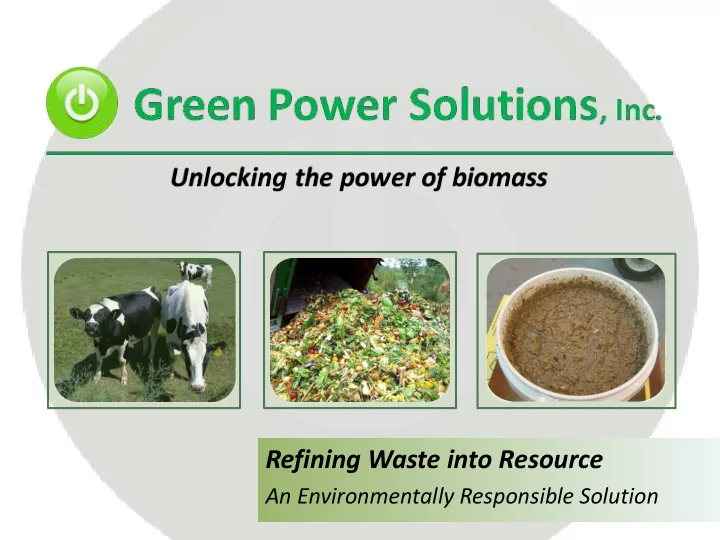

Refining Waste into Resource Refining Waste into Resource An Environmentally Responsible Solution An Environmentally Responsible Solution 1
GPS A Zero Waste Organization GREEN POWER SOLUTIONS, INC. PO BOX 411 BOTSFORD CT 06404 2
GPS Turning Waste into Resource Green Power Solutions’ core business is to: Capture the value of organic wastes through refinement into higher value products Green Power Solutions facilitates organic waste processing to supply refined products to the following markets: Energy- Clean Renewable Electricity through the anaerobic digestion of organic wastes Oleo Chemicals- Refining of waste lipids providing refined feedstock to the advanced biofuel and biochemical supply markets Organic Fertilizers- Refined nutrient-rich soil amendments for use in agriculture Green Power Solutions is a privately held corporation in business since 2006 Headquartered in Newtown, CT Currently generating industrial chemicals from waste grease sources Currently supplying feedstock (organic waste) to multiple New England AD facilities Focused on the development of Anaerobic Digestion facilities in Connecticut 3
GPS The GPS Organic Waste Solutions The GPS Organic Refining Plan is focused on urban waste greases and residual food solids created in highly populated areas throughout North America. Anaerobic Digestion Agricultural Wastes Supermarkets & Restaurants Institutions Food Manufacturers Water & soluble organics Fats, Oils, Grease (FOG) Refining DAF Sludge VOC capture Water & soluble inorganic (to WWTF) High FFA Heat Sewer/Trap Greases Product Recovery Storage Water FFA Feed Centri- Pump Filter Fry-o-later greases Prep fuge Product Heating Solids Polishing Grease Refining Butcher waste scraps Steam Fertilizer or Fines to FFA to Anaerobic Disposal Biofuel Digestion Production Feed Off-spec Yellow Grease Low- Value Steam Greases Boiler and Food Wastes 4
GPS The Organic Waste Opportunity Legislative Progress - Organics Diversion Organic Bans – Multiple NE States have instituted or are considering organic disposal bans 2010 MA DEP Draft Solid Waste Master Plan Set a goal to divert 350,000 tons/yr of food waste by 2020 Includes ban on disposal of commercial food waste starting in 2014 2011 State of Connecticut Public Act No. 11-217 Organic waste ban for commercial generators >104 tpy 2012 State of Vermont Public Act No. 148 Organic waste ban for commercial generators >104 tpy 2014 State of Rhode Island Public Act H7033 Substitute A Similarly instituted an organic waste ban for generators >104 tpy 5
GPS The GPS Focus - Connecticut Phase I - GPS plans to construct anaerobic digestion facilities to reform organic wastes generated throughout the East Coast, starting in Connecticut. Woodstock, CT = AD Facility 6
GPS Project 1: Woodstock BioEnergy Center Woodstock, CT Anaerobic Digester and R&D Facility Location: Fairvue Farms, Woodstock, CT CAPEX: $10.5 Million Dollars Nameplate Generation: 1 MW On-site energy to power the Fairvue Farm operation, plus additional capacity sufficient to meet the demand of 800 CT homes. Feedstock: 42,000 tons /year of manure/AG waste 35,000 tons /year of food waste Biomass R&D Facility: Research Biomass-to-energy/feed technologies. Project Financing: Grants, Debt & Equity 7
GPS The Organic Waste Opportunity - CT Connecticut State-wide Solid Waste Composition and Characterization Study, Final Report; May 26, 2010 http://www.ct.gov/dep/lib/dep/waste_management_and_disposal/solid_waste/wastecha rstudy/ctcompositioncharstudymay2010.pdf Highlights Nearly 500K tpy of organics being incinerated or landfilled. At $60 a ton, this represents a $29.6 million dollar revenue opportunity 8
GPS CT Legislative Progress – AD Incentives Significant legislative rule making needs to be implemented to spur investment into AD facilities. CT Progress to date – Anaerobic Digestion Incentives 2011 AD Pilot Program – State funding for AD facilities Project Financing - $450 per kw of generation 2013 Legislative Energy Bill – Defined Anaerobic Digestion as a Class I renewable, allowing for CT REC sales. 2013 Virtual Net Metering Bill – Defined a retail program for AD projects for both municipal and agricultural producers that offers retail generation rates including a portion of transmission and distribution values. 9
GPS CT Legislative Progress – In Reality Progress Reality Connecticut - AD Specific Road Blocks 2011 AD Pilot Program – State funding for AD facilities To Date – 5 projects have been selected; 0 facilities have been built 2013 Energy Bill – Defined Anaerobic Digestion as a Class I renewable, allowing for CT REC sales. Due to ZREC/LREC Program – Traditional RECS are price and term limited. Traditional RECs no longer trade for long term fixed pricing 2013 Virtual Net Metering Bill – Agricultural Producers AD Projects are competing against LREC/ZREC subsidized projects Unlike Municipalities, to qualify for VNM Farms have to own these projects outright. VNM Credit Values change on a 6 month basis, leaving significant risk in project investment 10 10
GPS Jumpstarting an Organic Waste Industry How to jumpstart an Industry – Real Legislative Solutions Legislation needs to eliminate/reduce long term risk Long Term Fixed/defined off-take agreements must be available to these projects. (Options) Institute an AD Specific Carve-Out Similar to solar carve-out legislation, mandate the utilities to purchase a % of their total power supply from AD energy sources. Alternatively - Institute an AD Feed-in-Tariff (FIT) Similar to the Vermont or Ontario FIT programs Instituting an AD-RECs Similar to the Z-REC and L-REC programs Allowing Class I AD technologies compete for long term off-take contracts with utilities. 11
GPS What do you think? Discussion Points How to get State energy policy to value the organic diversion benefits of these projects? Why are Net Reduction Technologies (such as AD) as defined by REGI not considered to be on par with technologies like solar and wind? Over time, tipping fees for organic waste will likely reach a $0 rate due to competition, improved technology, and unlevered facilities. Due to the public benefit, does it make sense to look to states/municipalities to facilitate bond funding for such projects? This has been the norm for large scale burn facilities? 12
GPS GPS – Contact Information Contact Information William Rees Green Power Solutions, Inc. PO Box 411 Botsford CT, 06404 (206) 571-0050 william@gps-biomass.com 13
Recommend
More recommend